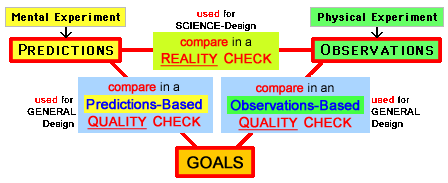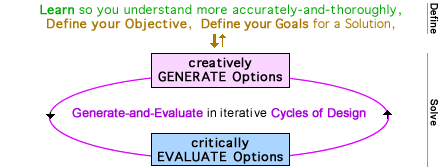
This page contains “additional ideas” that supplement “the main ideas” in my page about Using Prayer for Effective Living.
Earlier, I say YES because I think that when Christians ask God for help during a process of problem solving, our praying will help us improve in many ways,* when...
God provides insights & guidance,
we pay attention to our process of problem solving, with metacognition,
and also because...
God can influence our actions, and the results of our actions (as in Exodus 17:11), and
just taking time to relax usually is beneficial, and
just expecting to improve often brings improvement. (with a placebo effect)
* re: WHAT can be improved, the "many ways" include improving our character, understandings, compassion, love-in-action, and wisdom, now & later, plus the situation-results of our thinking & actions. But God will not make you perfect during Life, so appropriate humility is justifiable.
Is there any evidence to support these claims-for-YES? (asking “can God help us improve?” and “does God help us improve?”) When we search for evidence from the Bible and from science, we find...
a lot of biblical evidence: The Bible clearly states that God can (and does) help us, by "providing insights & guidance" and in other ways. These biblical claims are consistent with personal observations made by me and by many other Christians. {more - biblical evidence}
some scientific evidence: Let's look at research about the overall effects of prayer, and about possible causes of improvement. We find...
some research showing some overall benefits of prayers.
And regarding possible causes,
very few scientific studies (maybe none) investigating whether God does (or doesn't) "provide insights & guidance."
many studies showing the benefits of metacognitively "paying attention to our process of problem solving," but fewer studies about the effects of learning & using principles-for-process similar to those described in my website; but we have logical reasons to predict (by doing mental experiments) that learning principles-for-process (and “paying attention to process”) will be beneficial.
many studies showing the overall benefits of "taking time to relax," as with controversial educational activities doing mindful meditation. {but this isn't just "relaxing", it involves more and affects more} {the observed effects are mixed (with some positives & negatives), but overall are positive}
and in many studies we observe that just expecting to improve often brings improvement due to a placebo effect that can cause confusion about cause-effect relationships, so the effects of placebos should be considered when designing experiments.
results are different for different... kinds of evidence; kinds of WHAT-improvements (e.g. there are stronger biblical claims for some [character, love] than for others [creativity], and there is stronger scientific evidence for some [physical] than others [cognitive]); kinds of prayer and/or mindful meditation; people with different worldviews; people with different ages (e.g. pre-K children thru young adults to elderly); contexts (e.g. school [private, public] or psychological counseling, or yoga class, church group,...
a Person – the triune God (Father, Son, Holy Spirit) – decides His responses to prayer, and in each particular case His responses depend on the person and their situation, so His responses are not mechanistic and scientifically predictable.
{more - scientific evidence} {a slide about WHETHER in my PowerPoint Outline}
This table shows possible questions to ask, re: ideas above (about EVIDENCE) when we consider specific sub-groups, with interactions between kinds of people (Christian, Jewish,...) and kinds of prayer (theistic, or “non-religious” meditation, or a mix). What is the evidence for “effectiveness” (however this is defined or measured) in each cell? For example, what about prayer for an agnostic, or meditation for an agnostic.
Also we could ask (if we had a 3-dimensional table, or multiple tables) for evidence of various types: biblical, experiential, scientific. And (with a 4-dimensional table, or multiple tables, for various complicating factors) for different possible effects: physical, "spiritual", behavioral, emotional/affective, cognitive. { I don't think there is much evidence about the presence (or absence) of cognitive effects, but I don't yet know; probably there is much more evidence about other kinds of effects. }
| PEOPLE who are: |
Theistic Prayer (WITH God) |
or a mixture of ← both types → |
Mindful Meditation (WITHOUT God?) |
| Christian (theist) | |||
| Jewish (theist) | |||
| Moslem (theist) | |||
| other religions | |||
| agnostic | |||
| atheistic |
Appropriate Humility: When you ask God for help, He will help you improve, but you should have appropriate humility.
Here are three ways (A B C) to look at the same flexibly improvised process of solving problems, by Using Cycles of Generate-and-Evaluate, or Using Cycles of Plan-and-Do/Observe, or Using Experiments.
A. Using Cycles of Generate-and-Evaluate: When you are Defining Problems and Solving Problems in all areas of life, as shown in the diagram's top part (to Define) and bottom part (to Solve):

• First, to Define a Problem you Learn More (about a Problem-Situation) so you understand more thoroughly-and-accurately, so you can Define your Objective (for what you want to “make better” and how you want to invest your valuable time by deciding “what is the best use of my time right now? or later?”) and Define your Goals (for a satisfactory Problem-Solution);
• Then, to Solve the Problem you creatively Generate Options (for a Problem-Solution) and critically Evaluate Options, and you continue Generating-and-Evaluating Ideas (about Options for a Solution) in cycles of creative-and-critical thinking until you decide on a satisfactory Plan (for problem-solving action to achieve a Solution) so you can do this Plan.
Pray for Your Problem-Solving Process: Why should you pray for your process, and how? When you pray, asking God for help with your process of problem solving, two good things happen:
because you have asked for help, God is more likely to help you improve your thinking, AND you are paying attention to your process, so you will try to think productively by getting accurate understanding and doing creative-and-critical thinking, by asking...
“what is the best use of my time? (i.e. what should I be doing, in my efforts to make things better?)” to choose a Problem-Objective;
and while you're trying to solve this Problem, “what should I do next, in my goal-directed flexibly improvised decisions about how to solve this problem?”;
and “can I think more effectively in creatively Generating Ideas, and critically Evaluating Ideas?”;
and for problems involving people, “what do they want? what do I want?” with empathy & self-empathy, and “how might we achieve a better win-win result?”;
and other process-questions, based on the process described in A, B, or C.
Perspectives A (above) and B & C (below) describe the same process. Using a different perspective, you can view the process as Cycles of Generate-and-Evaluate (in A) that (in B) occur within Cycles of Plan-and-Do/Observe.
B. Using Cycles of Plan-and-Do/Observe: You can learn more from your experiences by using cycles of Plan-and-Do/Observe followed by RePlan-and-Do/Observe. How? You make a Plan (for problem-solving action), then you Do the Plan and Observe what happens,* so you can adjust (if you think this will help) when you Re-Plan for the next time, in your next cycle(s) of RePlan-and-Do/Observe.
* Two Kinds of Experience, Physical & Mental: You can learn from your experience when you Do the Plan and you Observe what did happen (in a physical experience) or (in a mental experience) when you imagine doing the Plan and you Predict what would happen.
One way to learn from experience is to develop-and-improve strategies for thinking in all areas of life.
We can learn from every experience – as described here and here – whether we consider it to be a success or failure. In fact, we often learn more about “doing it better the next time” from failures, as in the experiences that motivated me to write this page.
Below, C is a deeper exploration of the interactions that occur – during your process of problem solving – between Information & Evaluation & Generation.*
C. Using Experiments: During a process of solving problems, you USE Experiences (i.e. you USE Experiments) in four ways:
1. for Experiment → Information, you USE an Experiment to make Information, when you make Predictions (for what will happen) by doing a Mental Experiment, or you make Observations (of what did happen) by doing a Physical Experiment;
2. for Information → Evaluation, you USE this Experimental Information to do Experiment-Based Evaluation by Comparing 3 Elements (Predictions, Observations, Goals) in 3 Ways. {first imagine these 3 Ways to Compare, and then look below at * }
3. for Evaluation → Generation, you USE this Experiment-Based critical Evaluation (of an old Option) to stimulate-and-guide your creative Generation (of a new Option);
4. for Evaluation → Generation, you USE this Experiment-Based critical Evaluation to stimulate-and-guide your creative Generation (of new Information) by asking “what additional Information (Predictions and/or Obervations) would be useful for Evaluation? and what Experiments will help me get this Information?” so you can creatively design new Experiments to USE in these four ways.
* You can explore interactions by thinking about each part of the process (1 2 3 4) and then clicking the links above, plus here & here for verbal-and-visual explanations with more details and depth.
* Above I say: "2. ... you USE this Experimental Information to do Experiment-Based Evaluation by Comparing 3 Elements (Predictions, Observations, Goals) in 3 Ways." What and Why? In each Comparison of 2 Elements, you are doing an evaluative Reality Check for Science-Design, or an evaluative Quality Check for General Design, as shown here:

3 Comparisons of 3 Elements: While you're trying to Solve a Problem you Generate Options (for a Problem-Solution) and Design Experiments that you Do (mentally and/or physically) so you can Use the Information (mental PREDICTIONS and/or physical OBSERVATIONS about the Properties of an Option) to Evaluate the Option, and you use this critical Evaluation of Ideas for your creative Generation of Ideas. During your Evaluation you can compare Predictions & Observations (made in Mental Experiments & Physical Experiments) with each other and with your GOALS for the Properties of a satisfactory Solution.
These problem-solving actions are shown verbally-and-visually in Diagrams 1, 2a, 3a, 3b where you also can see diagrams for Using Experiences (i.e. Experiments) and Cycles of Plan-and-Do/Observe.
And of course you can pray for your problem-solving process, for the actions described in A, B, or C.